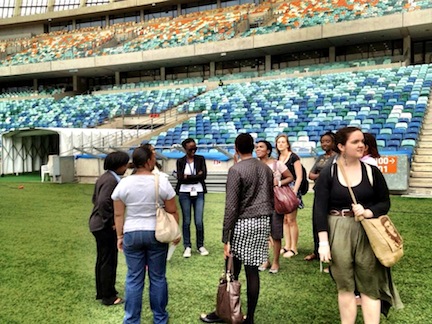
Guest Post by *Liz Timbs
In eMpangeni, a small city of 110,000 people in the sugar-producing area of Zululand, South Africa, my host family, the Khuzwayos, seemed typical of the local football fans I had read and heard so much about before arriving for two months of isiZulu language training. Both my “brothers,” Lindane and Njabulo, played soccer and supported PSL Champions Kaizer Chiefs. Lindane, however, also admitted to being a big Cristiano Ronaldo fan.
When I left eMpangeni for Durban (pop. 3+ million!), I found similar loyalties in my new host family, the Nenes. My brother, Ntuthuko, and my sister’s boyfriend, Mthembeni, were both diehard supporters of Kaizer Chiefs, so I “had to” fall in line with them. I was so proud when I finally bought my amaKhosi jersey, but my sister, Noxolo, was horrified; she emphatically told me that she wouldn’t go out with me in public if I was wearing it . . . but that’s a story for another time.
My other sister, Nothando, is an athlete in her own right, so we spoke often about sports. One evening I started asking her about football and was struck by her statement that she preferred watching European matches, especially La Liga contests, a lot more than the South African PSL, let alone Bafana Bafana, the country’s struggling national team. I must have looked completely shocked when she said this, because Nothando started laughing at me (a fairly common occurrence, to be honest) and then went on to explain that European teams’ play was tighter and more professional than that of South African sides.
“They jika too much, those guys,” Nothando declared. In isiZulu, the verb ukujika literally means “to turn,” but the term has also become shorthand for showboating on the football pitch. South African players, in her opinion, cared far more about showing off than about playing clean, controlled football, so she liked to watch world-class teams like Barcelona and Real Madrid instead.
When I went to Pietermaritzburg, the provincial capital of KwaZulu-Natal, to spend time with Izichwe Football Club, I decided to make it a point to ask the players which teams they supported in order to see if Nothando’s opinions would be echoed by other teenagers.
In one of my first interviews, taking care not to ask about a South African team specifically, Asanda told me that he supported Chelsea. He gave a careful, detailed response about their playing style and the specific reasons why he supported the Blues. When I asked him if he had a favorite South African team, his response was less enthusiastic: “I wouldn’t say there is one, but I prefer Orlando Pirates.” Looking back now, I wish I had pushed him on the reasons why, but I had caught him during one of his school breaks and time was short.
When I spoke to the other players on the team, I got largely the same reaction. They would first respond with their favorite European clubs (e.g. Barcelona, Arsenal, Manchester United), then almost as an afterthought they named a South African team, usually Kaizer Chiefs or Orlando Pirates. (One boy was partial to Mamelodi Sundowns, while none supported Maritzburg United).
So what does this tell us about the nature of fandom in South Africa? Maybe nothing terribly revealing given the fairly small sample that I’m pulling from. But taken with the other “evidence” that I gathered over two months it suggests that South African fans have multiple allegiances.
At the Amazulu-Manchester City “Mandela Day” match at Mabhida Stadium, I saw exponentially more people wearing the colors of Manchester United than AmaZulu green. In the market stall where I bought my Chiefs and Bafana Bafana jerseys, there were far more European soccer jerseys available than South African ones.
It seems that the trend is to support European teams first, then the local South African teams. Is this just because of the quality of play, as Nothando Nene told me? Or is it about the accessibility of televised games and the incessant marketing of Messi, Ronaldo, and other global mega stars? Is sport ushering in a new form of colonialism or is there more going on here than meets the eye?
–
*Liz Timbs is a PhD student in African history at Michigan State University. Her research interests are in the history of health and healing in South Africa; masculinity studies; and comparative studies between South Africa and the United States. Follow her on Twitter: @tizlimbs
Month: September 2013
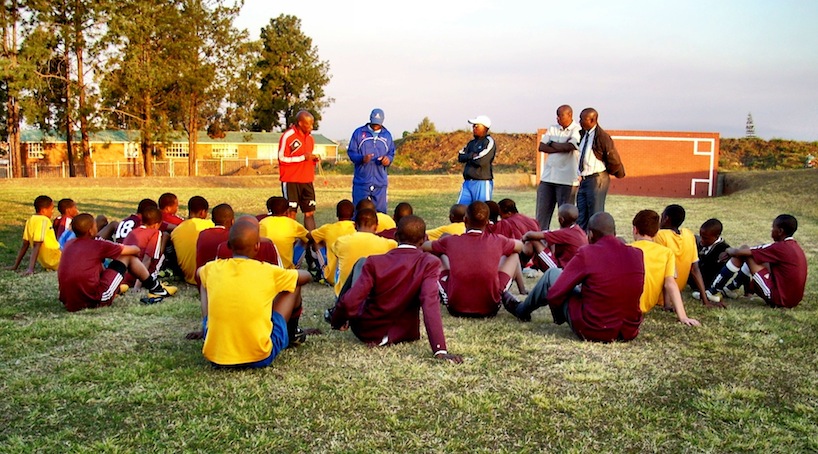
Guest Post by *Liz Timbs
In August 2013, I had the privilege of spending three days with the Izichwe Football Club in Pietermaritzburg, capital of South Africa’s KwaZulu-Natal province. During my brief stay, I observed training sessions, visited players’ high schools, and interviewed some of the young men and coaches. The quotes below come from these conversations.
Every weekday afternoon at the University of KwaZulu-Natal campus in Pietermaritzburg, two dozen 10th grade-boys come together on a humble football pitch to hone their skills at Izichwe Football Club. Established in 2010 and named after the first military regiment (ibutho) commanded by Shaka Zulu, the club is “not just about kicking a ball,” says Thabo Dladla, founding director of Izichwe and Director of Soccer at UKZN. It is also about developing young men of character and respect who represent their communities and themselves with pride and honor.
Respect (inhlonipho in the Zulu language) and discipline (inkuliso) are core values at Izichwe as they are in Zulu culture more broadly. The coaches refer to the teenagers as amadoda (umarried young men) and even baba (father) to stress the importance of carrying themselves in a mature way on and off the pitch.
These two dozen high school boys at Izichwe embody the values and lessons imparted to them by their coaches, especially Thabo’s emphasis on showing self-respect as much as respect for others. When I spoke with the youngsters, they politely thanked me for coming to Pietermaritzburg to meet them and spoke with poise beyond their years.
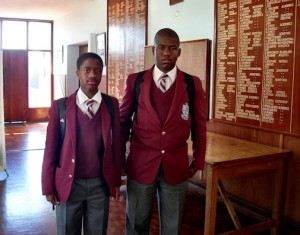 “The program is not only about sports or soccer. It’s mostly about life,” Asanda tells me. Izichwe is “about respecting the people you are around, and playing fair, which applies in life. You do it the right way. Don’t cheat. Don’t cheat yourself.” Similarly, Simphiwe stated, without hesitation, that Izichwe had taught him “to work hard in life and to respect your instructors.” Asanda and Simphiwe’s statements were echoed in a team meeting I observed. Technical director Mhlanga Madondo, a police officer, entreated the players to look at their performances in the previous weekend’s tournament, stating that he expected them to “take responsibility for their own growth.”
“The program is not only about sports or soccer. It’s mostly about life,” Asanda tells me. Izichwe is “about respecting the people you are around, and playing fair, which applies in life. You do it the right way. Don’t cheat. Don’t cheat yourself.” Similarly, Simphiwe stated, without hesitation, that Izichwe had taught him “to work hard in life and to respect your instructors.” Asanda and Simphiwe’s statements were echoed in a team meeting I observed. Technical director Mhlanga Madondo, a police officer, entreated the players to look at their performances in the previous weekend’s tournament, stating that he expected them to “take responsibility for their own growth.”
Hard work is another crucial component of the Izichwe way. When I asked Lindi what the program had given him, he said, simply: “discipline.” Every day, without exception, the boys make their way to the university sports fields to train from 3:30p.m. to 5:30p.m. Many of the boys also play for their school teams at least one day a week (with one boy competing in cross country events in addition to playing school soccer). Saturday is match day in a local amateur league. Sundays are reserved for tournaments. This intense, demanding schedule instills in the boys not only physical endurance and strength, but mental acuity as well. Dladla believes this constant pressure shows the dedication and perseverance of his players. “Boys like Siphesehle (the cross country runner), he’s very, very competitive, you know? He did cross country; he came [to training], and I said, “Hey! You rest!” He said, “No, coach! I came to train!”
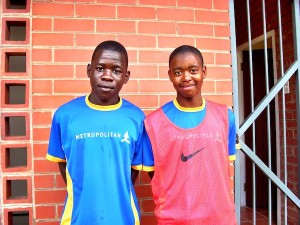 Although the players’ development as athletes is central to the program, Thabo, a former teacher and ex-professional footballer, regularly reminds players that “nothing in this life is as important as knowledge.” As a result, the program integrates numerous educational programs into their activities. Every night at the conclusion of practice, around 5:30, a group of the players gathers in a classroom on campus to study under the supervision of volunteer university students.
Although the players’ development as athletes is central to the program, Thabo, a former teacher and ex-professional footballer, regularly reminds players that “nothing in this life is as important as knowledge.” As a result, the program integrates numerous educational programs into their activities. Every night at the conclusion of practice, around 5:30, a group of the players gathers in a classroom on campus to study under the supervision of volunteer university students.
The coaches closely monitor individuals’ academic performance by reviewing school progress reports. This scrutiny, one parent explained, helps to “notice any hiccups in their progress at school.” In the opinion of Devon, the life sciences teacher at Alexandra High School, which several Izichwe boys attend, such devoted attention to player’s academics is unusual when compared with many other students who lack such careful supervision. “It’s a structured lifestyle which, I think, is lacking in a lot of our schools,” Devon explained. “I think that’s partly why these boys are so successful. They grow and they excel in every area.”
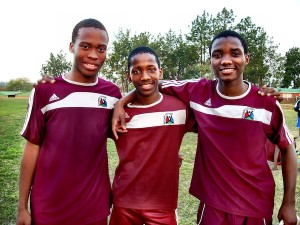 The youngsters openly expressed their gratitude to the adults who put precious time, energy, and resources into the program. “There are many kids out there who want this opportunity and we are very special to get that,” Mpumelelo said. Sandile stated unequivocally that the program has “changed the most part of my life.” Keelyn agreed, and without hesitation added that thanks to Izichwe, “I found myself.” Sandile spoke passionately about his appreciation for Izichwe: “Basically, what this program means to me is that it gives me the opportunity to realize a dream that I never thought . . . it was never something I believed I’d be able to do . . . it just made me realize, if I continue working hard enough, I can be one of the best players in the world.”
The youngsters openly expressed their gratitude to the adults who put precious time, energy, and resources into the program. “There are many kids out there who want this opportunity and we are very special to get that,” Mpumelelo said. Sandile stated unequivocally that the program has “changed the most part of my life.” Keelyn agreed, and without hesitation added that thanks to Izichwe, “I found myself.” Sandile spoke passionately about his appreciation for Izichwe: “Basically, what this program means to me is that it gives me the opportunity to realize a dream that I never thought . . . it was never something I believed I’d be able to do . . . it just made me realize, if I continue working hard enough, I can be one of the best players in the world.”
The Izichwe coaches are also grateful to be part of this project. Coach Madondo said that working with these young men has inspired him; he’s seen them “not just growing physically, but also [in] how to approach life.” Coach Ronnie “Reese” Chetty, who had a long coaching career including experiences in the United States, told me he is reinvigorated by the hard work and dedication these young men exhibit on a daily basis. The coaches are also driven and guided by the hardships, struggles, and perseverance of some of the players and families.
“It’s people like Sipesehle and Mhlengi’s mothers who sometimes give me lots of motivation when I see how hard they try, you know?” explained Thabo Dladla. “So then, I say: ‘Hey man! I cannot give up. I cannot let them down. So let me try and help them develop real men,’ you know?”
And from what I saw these Izichwe boys are becoming real men of immense diligence, humility, discipline, and respect. And, perhaps even more so, this community of boys, men, and parents demonstrates the great potential for grassroots soccer programs to fuel the development of not only athletic talent with a bright future in sport, but also of productive citizens in a democratic society.
—
*Liz Timbs is a PhD student in African history at Michigan State University. Her research interests are in the history of health and healing in South Africa; the professionalization of medicine; masculinity studies; and comparative studies between South Africa and the United States. Follow her on Twitter: @tizlimbs
Football 150: Conference Report

Guest Post by Dr. Matthew L. McDowell
The new home of the National Football Museum, the Urbis Building in Manchester, was the site of an international conference on September 2-4, 2013, celebrating the 150th anniversary of England’s Football Association. The event welcomed a group of around sixty speakers and an even larger group of delegates from different disciplines interested in the past, present, and future of football: its culture, its finances, its development, and its governance.
The varied affiliations of the participants made for some rather productive tension: critics of world football’s leaders and patrons rubbed shoulders with officials from the FA and UEFA, and no words were minced. Sir Trevor Brooking’s appearance at the outset of the conference, and Karen Espelund’s keynote address on the final day, were sandwiched around acclaimed author David Goldblatt’s second-day keynote: a brilliant, scathing, and often surreal account of FIFA in relation to the Brazilian riots of this past summer, which occurred while the Confederations Cup was staged in the country. (Those who were at the address will never think of AC/DC’s “Hell’s Bells” in the same way again.) All in all, it made for a highly enjoyable three days, and the National Football Museum (especially Dr. Jane Clayton and Dr. Alex Jackson) and the University of Central Lancashire’s International Football Institute pulled out all of the stops to ensure that all of us working within the broad continuum of “football studies” felt at home.
After Brooking’s interview with UCLan’s John Hughson – one of the driving forces behind the gathering – Tony Mason of De Montfort University, a renowned expert on English football’s history, introduced us to previous commemorations of the FA’s anniversary: some lavish, some passing barely noticed. I attended various sessions afterwards. Naturally, I leaned toward history: Tony Collins, Roy Hay, and Gavin Kitching formed an excellent panel advocating more research into what Collins called the “primordial soup” of football in the pre-Association era. The term “football,” as both Hay and Kitching stated, was representative of a very broad church prior to 1850, and was not confined to the “public school” sphere. Afterwards, I attended a session on the history of ‘soccer’ in the United States, with my native New Jersey finding its way into both Brian Bunk’s and David Kilpatrick’s papers: Bunk discussed the football-playing circle of the mid-nineteenth century Princeton University, while Kilpatrick discussed the colorful, controversial and recently-revived New York Cosmos, whose 1970s’ home was the NFL’s Giants Stadium. The “Nostalgia and Design” panel, which featured Jean Williams, Graham Deakin, Ffion Thomas and Chris Stride teased out the meanings in some of football’s most iconic (and, in the case of Shoot and Goal magazines, not-so-iconic) images through various media.
The second and third days featured their fair share of highlights. Notable among them was Gary James, who gave us a glimpse into late-nineteenth/early-twentieth century football in Manchester, a subject long neglected by academic historians. Matthew Klugman, Svenja Mintert, and Jessica Richards, meanwhile, discussed their own pioneering research, and their attempts to examine the emotions, desires and suspicions of “the fans” in a wide variety of time periods, places, and guises. (Richards, whose ethnographic research examines the match-day rituals and gender performance of Everton supporters, candidly discussed the risks associated with field work.) Meanwhile, “The Role of the Individual,” which featured Clayton, Jackson, and Dilwyn Porter, critically examined the mythology of some of football’s greatest characters, in relation to the archival material which actually exists regarding them. Referees, it seems, took great pains to present themselves in a heroic light against agents of chaos: Porter’s examination of 1930s referee Percy Harper stated that that Harper featured death threats from supporters in his own personal archive, perhaps as kinds of trophies. The ‘World Cup’ panel featured its own fair share of surprises. Though Peter Alegi could not make it to discuss his history of South Africa 2010 (the perils of transatlantic travel!), Marion Stell and Daniel Malanski examined FIFA’s global showcase in relation to Australian and Brazilian football history respectively, showing us that domestic politics inevitably colors how individual nations view participation in the tournament.
One wonders what Football 200 will look like. Will the ‘beautiful game’ continue to stress the paradoxes of being the world’s most popular sport, while at the same time being a focal point for fierce tribalism? Will we be bemoaning the “good old days” of the 2010s, a day before money, political correctness, and middle-class sanitisation took their toll on the viewing experience of the people? The thread of nostalgia has always run through popular perceptions of what the game should be; and, as Football 150 and its constituent presentations have shown, there is no one unified consensus on what the game has represented, or what it continues to demonstrate regarding our world. It is as confused as we are; and perhaps that, above all, is the appropriate message of the conference.
**
Dr. Matthew L. McDowell is a lecturer in sport and recreation management at the University of Edinburgh, Moray House School of Education. He was written on the early history of Scottish association football, and is currently researching Scotland’s history with the Empire and Commonwealth Games competitions, and early North Atlantic footballing cultural encounters. Follow him on Twitter: @MattLMcDowell
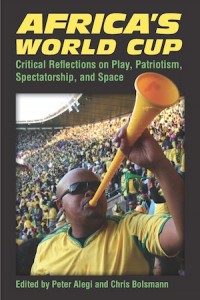 By Bruce Berglund (cross-posted from @NewBookSports)
By Bruce Berglund (cross-posted from @NewBookSports)
In 2010, for the first time, an African nation hosted the FIFA World Cup. The advertisements surrounding the tournament used graphics and sounds intended to conjure the image of a vibrant, exotic land. In fact, though, the African-ness of the South African World Cup was pretty thin, when not wholly fabricated. For example, the music that introduced ESPN’s World Cup coverage sounded very African, as it opened with the sounding of an ox horn (the promo showed a bare-chested tribesman blowing the horn atop a mountain, silhouetted against the setting sun) and then built with pulsing drums and a choir singing layered refrains. But the piece had been written by a composer from Utah, the musicians had recorded it in Utah, and the choir consisted of members of the Broadway cast of The Lion King. At least Shakira’s ubiquitous song “Waka Waka (This Time for Africa)” had a more substantial African connection. It had been lifted, initially without credit, from a Cameroonian military song made popular in the 1980s by the group Golden Sounds.
The ironies of the 2010 tournament in South Africa are revealed in a number of essays in Africa’s World Cup: Critical Reflections on Play, Patriotism, Spectatorship, and Space (University of Michigan Press, 2013), edited by Peter Alegi and Chris Bolsmann. In the interview with Peter, we learn of the findings and observations of the volume’s contributors: an international collection of anthropologists, architectural critics, bloggers, geographers, sociologists, journalists, photographers, and former players who all attended matches in South Africa. They make sharp criticisms of class divides at the venues, the nationalism and commercialism, and, of course, the imperial reach of FIFA. But as we hear from Peter, the book’s authors were also fans. When mixing with other fans outside the stadiums, and then cheering their teams when the matches began, even normally skeptical academics and journalists were caught up in the event. Their experiences show that, for all its faults, the FIFA World Cup is still an incomparable event.
Click here to download the mp3 of the interview.
Watch this great 20-minute documentary film on the tension and violence that accompanied the memorable Algeria-Egypt 2010 World Cup qualifiers.
Lots of rare footage captures the perspectives and experiences of the Algerian players and officials in both Cairo and Khartoum. Watch as the mainly France-based Les Fennecs players channel fear, insecurity, and rage into a memorable playoff victory and World Cup qualification. The scenes of joyous celebration among the traveling fans and players in Sudan, as well as the partying in the streets of Algiers are something to behold.
The film provides glimpses of both sides of the fútbol-nationalism coin. On the one hand, the Egyptian hooligans’ love of country expresses itself through hatred of the Algerian “other” and spills over into the vicious attacks on the visiting team’s bus depicted in the film. On the other hand, the Algerians’ patriotic unity propels them to victory against their rivals. Raw and riveting stuff.
Thanks to Mezahi Maher (@MezahiMaher) for the English subtitles!